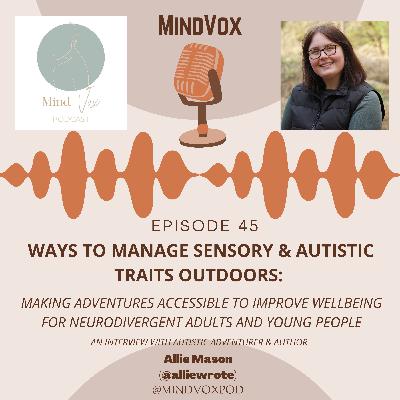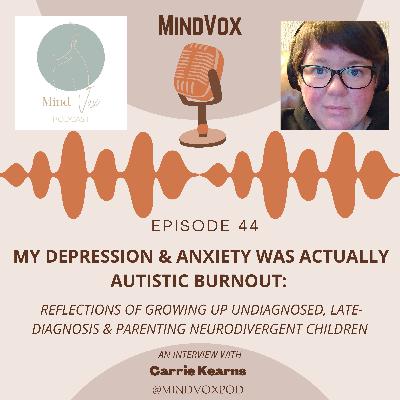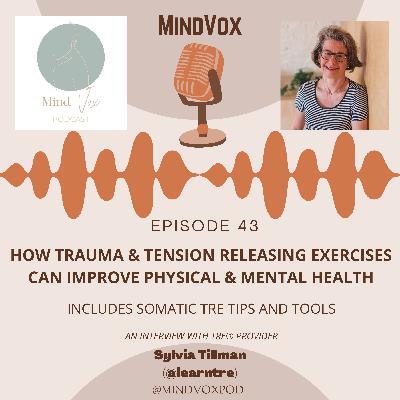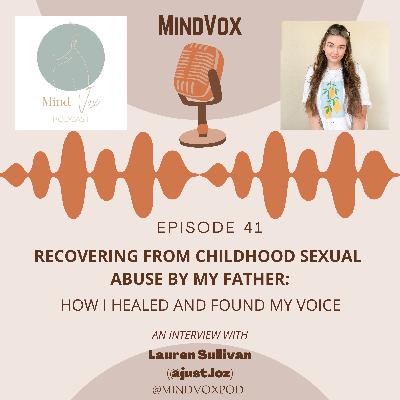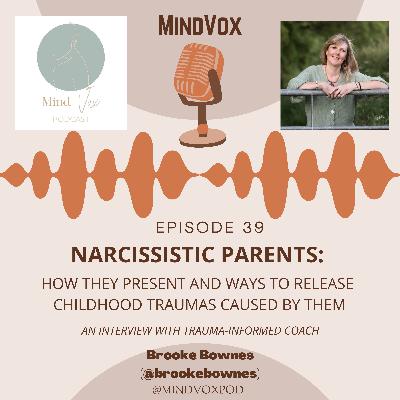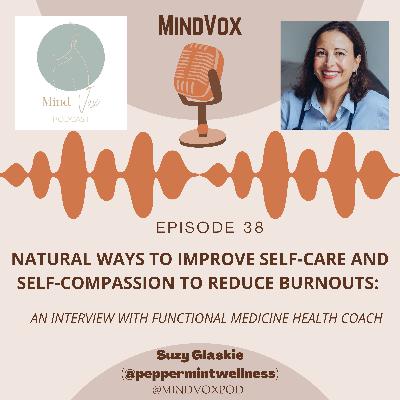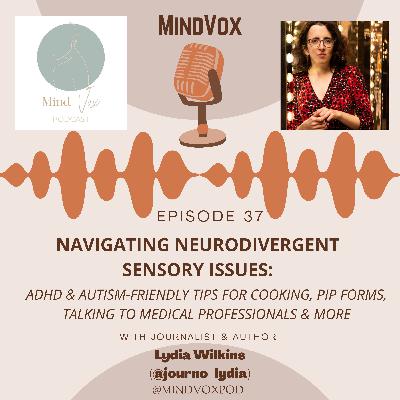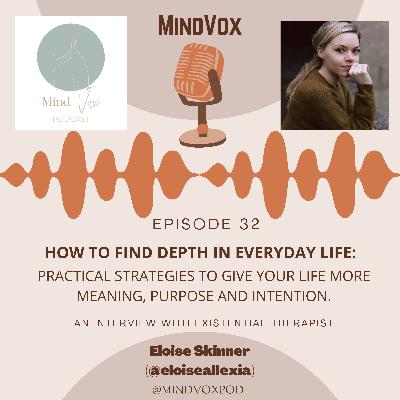Discover Mind Vox
Mind Vox

 Mind Vox
Mind Vox
Author: Claire Jacobs
Subscribed: 4Played: 49Subscribe
Share
© Claire Jacobs
Description
MindVox is a podcast all about the human mind, with the aim to educate, support and empower.
A fully inclusive space that explores mental health, neurodivergence, self-care and wellbeing without judgement.
Guests openly discuss their personal journeys with trauma, grief, mental health, neurodivergence and more.
Hosted by Claire Jacobs, writer of SingleParentPessimist.co.uk
*Warning*
We cover topics that can be of a sensitive or triggering nature, and always highlight these on each episode's show notes.
We're not medical experts, we're only experts of our own mental health experiences.
A fully inclusive space that explores mental health, neurodivergence, self-care and wellbeing without judgement.
Guests openly discuss their personal journeys with trauma, grief, mental health, neurodivergence and more.
Hosted by Claire Jacobs, writer of SingleParentPessimist.co.uk
*Warning*
We cover topics that can be of a sensitive or triggering nature, and always highlight these on each episode's show notes.
We're not medical experts, we're only experts of our own mental health experiences.
46 Episodes
Reverse
After two months of radio silence, Claire is back with a new Mind
Vox episode.
This is more of an update to what’s been going on, as well as what she’s learnt through the current issues she’s faced, and what’s coming up for the pod.
This episode explores:
-Why Claire hasn’t uploaded a pod episode in a while!
-Some of the symptoms she’s recognised as Autistic and ADHD
Burnout.
-Recent transitions that have been adding pressure and increasing the burnout, including school transitions and holidays.
-The limitations she’s faced to recover, including summer holidays as a single parent and being a sandwich carer.
-What Claire’s been doing to reduce the burnout and which have been the most helpful.
-Things she’s learnt from this most recent burnout to take forward for the next time.
-Ideas for future episodes.
*Trigger warning*
Contains conversation about Burnout, ADHD, Autism, Anxiety, Depression, Sensory Processing, Perimenopause, AUDHD, Trauma and Social Isolation.
Links
Claire featured on the ADHD Mums Podcast recently, and her interview can be found on episode 2.
To donate the price of a coffee to help the pod, find the CashApp, Paypal and BuyMeACoffee options on our Linktree in our bio.
To send us ideas for future episodes, or offer to be interviewed, please contact us via Instagram or email mindvoxpod@gmail.com
Your host, Claire, can be found on Instagram, TikTok and via her website Single Parent Pessimist.
Music by Lesfm from Pixabay.
---
Send in a voice message: https://podcasters.spotify.com/pod/show/mindvox/message
Allie Mason is a Children’s Author and a Landscape and Training Coordinator.
She was diagnosed Autistic at the age of 23 in 2020, and wants to talk about her late-diagnosis journey and what she has put in place to help with the Autistic traits that affect her wellbeing.
Allie describes herself as an Autistic Adventurer Extraordinaire, as she finds outdoor adventures help improve her wellbeing.
She wants fellow neurodivergent people to get outdoors for the same reason, which has inspired her first non-fiction book.
The Autistic Guide to Adventure was written to support Autistic young people to feel able to explore outdoor adventures if they have sensory processing issues that previously put them off attempting this.
Allie has come onto the podcast to talk about her late-diagnosis journey and the positive coping mechanisms she’s adopted since learning about her traits.
This episode explores:
-Allie’s Autistic late-diagnosis journey.
-Her reflections on being undiagnosed for 23 years, and misdiagnosed with other conditions.
-What Allie’s learnt about Autism and how to manage her traits since diagnosis.
-How Autism affects Allie’s wellbeing.
-How the outdoors and adventuring improve Allie’s wellbeing.
-Advice for ways other neurodivergent people can get outdoors when they’ve previously assumed it won’t work with their sensory needs and other traits.
-Creating a Sensory Toolkit to help indoors and outdoors.
-Exploring ways to enjoy nature with chronic pain and physical disabilities.
-What inspired Allie to write a book for Autistic young people, and how she hopes it will help them.
-How Allie managed the long editing and publishing process as a Neurodivergent.
*Trigger warning*
Contains conversation about ADHD, Autism, Anxiety, Depression, Sensory Processing, Lockdown, Skin-Ripping and unhealthy coping mechanisms including Self-Harm and Social Isolation.
Links
To donate the price of a coffee to help the pod, find the options on our Linktree (@mindvoxpod)
To send us ideas for future episodes, or offer to be interviewed, please contact us via Instagram or email mindvoxpod@gmail.com
Your host, Claire, can be found on Instagram, TikTok and via her website Single Parent Pessimist.
Music by Lesfm from Pixabay.
Allie’s book The Autistic Guide to Adventure can be bought here.
Allie’s website can be found here, and her Instagram and TikTok are @alliewrote.
---
Send in a voice message: https://podcasters.spotify.com/pod/show/mindvox/message
Carrie Kearns is a Veterinary CPD Tutor and Student Hypnotherapist and Counsellor.
They were a Pet Bereavement Counsellor for 22 years and are currently training as a Hypnotherapist.
Carrie has two children and is a late diagnosed Autistic who uses They/Them pronouns.
They were misdiagnosed with depression and anxiety before getting an Autism diagnosis, and their experience within the mental health system inspired them to now train as a counsellor.
Carrie talks about their late diagnosis journey, why they think functioning labels can be harmful and their experience of the mental health system, both diagnosed and undiagnosed.
This episode explores:
-Carrie’s misdiagnosis of depression and anxiety, which was actually Autism and ADHD, and their experience of burnout.
-How Carrie got through burnout and the work they’ve done to reduce future burnouts.
-The abuse and struggles Carrie dealt with throughout their life.
-Carrie’s late-diagnosis journey and how they’ve dealt with it.
-Why Carrie feels functional labels can be harmful.
-Carrie’s views on the mental health support offered in this country and how it could be improved for Autistics.
-Why Carrie decided to train in Hypnotherapy.
-The ways Carrie adjusted their parenting to meet their son’s Autistic needs, and their (suspected neurodivergent) daughter’s too.
-Autistic Meltdowns, Shutdowns and Burnouts- the differences between them and how Carrie manages them.
-Challenges Carrie has faced with trying to get their daughter assessed for Autism and ADHD, when she doesn’t present stereotypically.
*Trigger Warning*
Contains conversation about Physical and Mental Health Conditions, Trauma, Stress, Anxiety, Autism, ADHD, Abuse, Bullying, 17q12 Duplication Syndrome, Suicidal Ideation and Attempts, OCD, Dyslexia, Medications, RSD, Pet Bereavement and Aphantasia.
Links
To donate the price of a coffee to help the pod, find the CashApp, Paypal and BuyMeACoffee options on our Linktree in our bio.
To send us ideas for future episodes, or offer to be interviewed, please contact us via Instagram or email mindvoxpod@gmail.com
Your host, Claire, can be found on Instagram, TikTok and via her website Single Parent Pessimist.
Music by Lesfm from Pixabay.
The Neurodivergent Friendly Workbook of DBT Skills can be found here.
Samantha Craft’s Autistic Traits List can be found here.
Carrie’s podcast is called All Creatures Great and Gone and can be found on most platforms.
If you want to volunteer for Carrie while they train in Hypnotherapy, email cyclecounselling@hotmail.com
---
Send in a voice message: https://podcasters.spotify.com/pod/show/mindvox/message
Sylvia Tillmann is a TRE® (Trauma & Tension Releasing Exercises) Provider, specialising in teaching therapeutic ways to improve physical and mental wellbeing.
She’s founder of Tremendous TRE®, and is also trained in counselling, Jikiden Reiki and Laughter Yoga.
Sylvia feels that people hold too much tension in their bodies which can manifest in many forms, from chronic physical pain to mental health issues.
She believes TRE empowers us to learn to help and heal ourselves, rather than relying on others for various physical and psychological issues.
She's come onto the pod to talk about the benefits of TRE and to give examples of tools we can use to help ourselves at home.
This episode explores:
-What somatic tools are
-What TRE is and the benefits of it
-The benefits of somatic tools such as TRE
-Who TRE is designed for and what issues it can help with
-The impact that stress can have on our physical and mental wellbeing
-How we can improve our physical and mental wellbeing using TRE techniques
-Examples of TRE tools we can try at home for various issues and ailments
*Trigger Warning*
Contains conversation about Physical and Mental Health Conditions, Trauma, Lockdown, Stress, Anxiety, Autism, ADHD, Abuse, Trying to Conceive, War Zones, PTSD, Parkinson’s, MS and Alzheimer’s.
Links
To donate the price of a coffee to help the pod, find the CashApp, Paypal and BuyMeACoffee options on our Linktree in our bio https://linktr.ee/mindvoxpod
To send us ideas for future episodes, or offer to be interviewed, please contact us via Instagram or email mindvoxpod@gmail.com
Your host, Claire, can be found on Instagram, TikTok and via her website Single Parent Pessimist.
Sylvia can be contacted via her website Tremendous TRE and she can be found on Instagram, LinkedIn and Facebook.
The Body Keeps The Score book can be found on Amazon here.
David Berceli, PhD created TRE and has a book that explains it here
Music by Lesfm from Pixabay.
---
Send in a voice message: https://podcasters.spotify.com/pod/show/mindvox/message
Sue Bordley is an Author, Teacher and mother to two teenage sons.
She’s Autistic, which was discovered when her children were formally diagnosed with Autism. Sue’s self-diagnosed, and has some experience of the stigma surrounding self-diagnosis.
Sue’s taught English at secondary school for 26 years, whilst also writing novels for adults and teenagers.
Her latest book, Sweet Like Candy, features an Autistic family based on her own experience of family life.
Sue uses the pen name Jess Molyneux for some books, including XY, Z, which aims to educate teenagers about sex and consent. It also includes the message that women should be treated as equals in relationships.
Surrounded by ‘chick lit’ where women are often depicted as stereotypical shopping-obsessed, wine-loving and looking for a man to depend on, Sue wanted to change the narrative.
Sue chooses to empower women and girls through positive representation in literature, so female characters in her books are strong, sharp, funny and self-sufficient.
Sue’s come onto Mind Vox to discuss parenting neurodivergent children, her self-diagnosis journey and how she’s empowering women and educating teenagers about equality, consent and sex using books.
This episode explores:
-Sue’s journey to becoming an author for both teenagers and adults.
-Why Sue felt the need to educate teenagers about consent and gender equality within relationships by writing teenage fiction.
-Advice for how parents can use books like XY, Z to educate their children about sex, consent and relationships.
-Sue’s feelings around how women are represented within ‘chick-lit’ fiction and how she’s trying to encourage more positive representation of women in her work.
-Her experience of Autistic late self-diagnosis and reflections of being undiagnosed for so long.
-Sue’s experiences of parenting her (diagnosed) Autistic children, who also have Dyspraxia.
-How she’s been inspired by her own family to create an Autistic family in her latest book.
*Trigger Warning*
Contains conversation about Autism, ADHD, Sexual Consent, Gender Equality, Contraception, STIs, Andrew Tate, Peer Pressure, Sexuality and Dyspraxia.
Links
To donate the price of a coffee to help the pod, find the CashApp, Paypal and BuyMeACoffee options on our Linktree in the bio.
To send us ideas for future episodes, or offer to be interviewed, please contact us via Instagram or email mindvoxpod@gmail.com
Your host, Claire, can be found on Instagram, TikTok and via her website Single Parent Pessimist.
Music by Lesfm from Pixabay.
Sue’s books for teenagers can be found here: XY, Z and SE6.
Sue’s adult books can be found here: Sweet Like Candy and Rescue Me.
Sue can be found on Instagram and TikTok.
---
Send in a voice message: https://podcasters.spotify.com/pod/show/mindvox/message
Lauren Sullivan is a mother of two young daughters and is founder and illustrator of Loz Creates.
She grew up without her father, until he came into her life when she was a teenager.
He then groomed Lauren, supplied her with drugs, and abused her frequently. Lauren’s father was aware he was HIV-positive at the time.
Lauren has Complex Post-Traumatic Stress Disorder (CPTSD), Anxiety and Borderline Personality Disorder (BPD) as a result of the trauma from the abuse.
Her father was jailed, and has now completed his sentence. Lauren went through the restorative justice process which included writing an open letter to her father.
During the last few years Lauren has found great healing from creative outlets, including illustrating which led to her current business.
She waived her anonymity to help other abuse survivors, which has included speaking openly about her journey across social media and in the press.
This episode explores:
-The abuse Lauren suffered at the hands of her father.
-The impact of the abuse for her as a teenager and also presently.
-The stigma of abuse and challenges of disclosing it, including judgment, shame and guilt.
-What recovery from sexual abuse has been like for Lauren, and the healing journey she’s been on.
-The tools Lauren has used to try to heal the trauma, and how creative outlets help Lauren to heal.
-The processes Lauren went through for justice and why she waived her right to anonymity around it.
-What restorative justice is and Lauren’s experience of it.
-How Lauren manages the CPTSD and other mental health conditions
-The other continued effects of the trauma for Lauren and how she manages what she refers to as her ‘life sentence’.
*Trigger Warning*
Contains conversation about Self-Harm, Childhood Sexual Abuse, Grooming, Drugs, Solvent Misuse, BPD, CPTSD, Anxiety, Suicidal Attempts, Depression, Abusive Relationships and Dissociation.
Links
To donate the price of a coffee to help the pod, find the CashApp, Paypal and BuyMeACoffee options on our Linktree in our bio.
To send us ideas for future episodes, or offer to be interviewed, please contact us via Instagram or email mindvoxpod@gmail.com
Your host, Claire, can be found on Instagram, TikTok and via her website Single Parent Pessimist.
Lauren’s artwork can be found via her business website Loz Creates.
For information about the Name Change Sex Offender Campaign Lauren is part of, and the open letter she wrote to her father, visit Lauren’s personal Instagram Just.Loz
---
Send in a voice message: https://podcasters.spotify.com/pod/show/mindvox/message
Vanessa is a Vision Board Mentor and trained life coach, who specialises in helping people reconnect with how they want their life to be, if they’ve become overwhelmed or lost.
She was a successful business owner for 25 years and raised two children whilst experiencing grief, loss and serious illness.
With all of these factors at play, she began to feel stuck, so Vanessa tried vision boards and managed to make changes to her life that improved her wellbeing.
She believes vision boards can help with a multitude of issues, including finding a new direction in your life, and gaining motivation, focus and clarity.
Vanessa is now the founder of Vision Boards for All and believes there’s a vision board for everyone’s needs, and wants to explain the benefits to using them.
This episode explores:
-What vision boards are and how they can help our practical life, emotions and mental health.
-How vision boards helped Vanessa with her own life stresses.
-The theory and statistics behind vision boards.
-The benefits to using vision boards to increase motivation, positive outlooks and life goals.
-What our inner compass is, why we need to find it and how vision boards help us to do this.
-How vision boards can help you to reflect on your life and gain self-awareness of your current needs.
-The ways sports people use vision boards to help their mindset when competing.
-The types of vision boards that can be used and which work best for each type of issue, including holistic, digital and paper boards.
-How vision boards can be useful for Autism and/or ADHD in areas such as impulsivity, decision paralysis and burnout.
-Ways you can use vision boards with children for their wellbeing and difficulties they might be experiencing.
-Tips for creating vision boards, including life wheels.
-Ways to use the board effectively, including questions to ask yourself when looking at it, how it can motivate you to achieve goals, and using journaling and meditating alongside it as a tool.
-Using boards over long periods of time to assess how far you have come, or to notice changes you’ve made when you assume you’re still stuck.
ACTIVITY
I’m going to attempt a vision board and might try to get my son to do one, so if you feel inspired by this episode, let me know on the socials how you got on, and tag Mind Vox on any you share!
*Trigger Warning*
Contains conversation about Grief, anxiety, ADHD, Autism, Burnout, Depression, Divorce, Children’s mental health and trauma.
Links
To send us ideas for future episodes, or offer to be interviewed, please contact us via Instagram or email mindvoxpod@gmail.com
To donate the price of a coffee to help the pod, find the CashApp, Paypal and BuyMeACoffee options on our Linktree in our bio.
Your host, Claire, can be found on Instagram, TikTok and via her website Single Parent Pessimist.
Vanessa can be found at her website Vision Boards For All, and also Instagram and Facebook.
Free Life Wheel resource from NHS.
---
Send in a voice message: https://podcasters.spotify.com/pod/show/mindvox/message
Brooke Bownes is a Therapist, Brainspotting Practitioner and Trauma Coach, specialising in narcissistic abuse.
Throughout her life, Brooke has personal experience of trauma from a Narcissistic mother, a lack of self-confidence and imposter syndrome, until she found strategies to heal herself.
Referred to as the Trauma Breakthrough Queen, Brooke has also written a self-help book about the self-sabotage cycle.
Brooke’s mission is to raise awareness of The Mother Wound trauma from narcissist mothers, and educate others about ways to stop living in fear behind a mask, so they can be seen and heard.
She’s also a mother to four adult children, and has 9 grandchildren.
This episode will explore:
-How adults can try to heal childhood trauma.
-Brooke’s personal story and journey of being parented by a narcissistic mother.
-What narcissism is, including covert narcissism.
-What a narcissistic parent looks like, including how they treat each child differently, causing some to become co-dependent and others to also be narcissists.
-How gender can play a part in which child is targeted by the narcissist.
-The Mother Wound and Father Wound traumas, and how to heal from this.
-How narcissism can be misdiagnosed as other conditions, including Autism and Bipolar, and vice-versa.
-Ways to manage still having a narcissistic parent in your life when you’re an adult, to avoid further trauma.
-Advice for how to calm your nervous system.
-What to do if you recognise narcissistic behaviours within yourself.
*Trigger Warning*
Contains conversation about Childhood trauma, Narcissism, Covert Narcissism, Inner Child Wounds, EMDR, Brainspotting, Autism, ADHD, Gaslighting, Co-dependency and Domestic Violence.
Links
To send us ideas for future episodes, or offer to be interviewed, please contact us via Instagram or email mindvoxpod@gmail.com
To donate the price of a coffee to help the pod, find the CashApp, Paypal and BuyMeACoffee options on our Linktree in our bio.
Your host, Claire, can be found on Instagram, TikTok and via her website Single Parent Pessimist.
Brooke’s Book, You Can Have It! How to Break Through the Self-Sabotage Cycle, can be found on Amazon.
Brooke can be found on Instagram and Tiktok and be emailed via brooke@brookebownes.com
Brooke’s Facebook Group is called the Confidence Community- Be Confident, Seen, Heard, Have Fun.
---
Send in a voice message: https://podcasters.spotify.com/pod/show/mindvox/message
Suzy Glaskie is a Functional Medicine Health Coach and Founder of Peppermint Wellness.
During her career as a PR boss, Suzy became underweight, exhausted and constantly burnt-out.
Suzy believes her previous career created toxic stress hormones that led to a constant flood of inflammation in her body.
These health conditions and death of her father led Suzy to retrain as a health coach, where she learnt various ways to help reduce burnouts and improve wellbeing.
Suzy wants to share ways the body can heal itself and prevent future burnouts, using self-care and self-compassion tools.
This episode explores:
-What burnout can look like.
-Suzy’s personal journey through burnout.
-How the death of Suzy’s father was a catalyst for a career change.
-What functional medicine is.
-The benefits of natural lifestyle changes for wellbeing.
-Things we can do to reduce or prevent burnout.
-What self-care is and why it’s important.
-The benefits of self-compassion and ways to do it, including journaling using various voices.
-How food and drink can harm or heal.
-Suzy’s negative experience trying mushrooms for wellbeing.
*Trigger Warning*
Contains conversation about Grief, Weight Loss and Food, Stress, Anxiety, Depression, ADHD, Autism, Burnout, Breakdowns, Masking, Parenting and Psychedelics.
Links
To send us ideas for future episodes, or offer to be interviewed, please contact us via Instagram or email mindvoxpod@gmail.com
To donate the price of a coffee to help keep the pod running, find the CashApp, Paypal and BuyMeACoffee options on our Linktree in our bio.
Read Suzy's article about how to recognise and manage burnout on Claire's website.
Suzy can be found on Instagram, Facebook and her podcast is called Midlife Illuminated.
The free Wellness Unwrapped app can be found on Suzy’s Peppermint Wellness website.
---
Send in a voice message: https://podcasters.spotify.com/pod/show/mindvox/message
Lydia Wilkins is a freelance journalist, author and speaker, covering topics including disability, neurodivergence and social issues. She’s been featured in publications such as The Independent and The Metro.
Lydia is Autistic and has recently published a book called The Autism-Friendly Cookbook, for Autistic adults and teenagers to use on low-energy/ burnout days, or when needing inspiration.
The book contains 100 recipes, including modifications for those who are sensory seekers, sensory avoiders and those wanting new challenges.
Lydia has come onto the pod to talk about her own experience of Autism, and the sensory issues that can be part of both this and ADHD.
She will give some useful tips for managing sensory issues, including around the kitchen when trying to navigate cooking, especially on meltdown or shutdown days.
Lydia also has knowledge around the role of gender and eating disorders for Autistics, and strategies for parents trying to support their neurodivergent children’s needs.
This episode explores:
-Lydia’s personal journey to being diagnosed Autistic.
-How Lydia feels she is treated as an Autistic female by professionals.
-The traits that affect Lydia’s daily life, including sensory and socialising issues.
-Sensory Avoiders and Sensory Seekers: issues associated with Autism and ADHD, and what that means in the kitchen and eating.
-Ways to manage traits around eating for parents of neurodivergent children.
-Access issues in the kitchen, including interoception and proprioception.
-Adaptations that can be made to improve access issues.
-Lydia’s experience of the PIP process.
*Trigger warning*
Contains conversation about Avoidant Restrictive Food Intake Disorder (ARFID), Autism, ADHD, Chronic Pain, Disabilities, Mental Health, Thalidomide injuries, Long Covid, Shutdowns, Meltdowns and Eating Disorders.
Links
To send ideas for future episodes, or offer to be interviewed, please contact us on Instagram or email mindvoxpod@gmail.com
To donate to help the pod, find CashApp, Paypal & BuyMeACoffee options on our Linktree.
Lydia can be found on Instagram and Twitter.
The Autism-Friendly Cookbook can be bought here*.
Rebel Bodies by Sarah Graham can be found here*.
Find some Divided Plates and Separators* here.
Find Jar opener ideas here*.
ARFID Awareness UK
National Autistic Society
*aff links
---
Send in a voice message: https://podcasters.spotify.com/pod/show/mindvox/message
After a two week break, Claire is back to talk a bit about Autism and how it can present in women, based upon her own research and experiences.
Claire was diagnosed with ADHD a year ago, but has spent a year researching Autism which she now also identifies with.
This episode explores:
-How ADHD and Autism are common to have as dual diagnosis for up to 70% of people.
-Claire’s own experience of ADHD and Autism.
-Why Autism can be missed for many women for many years of their lives (including Masking).
-The similarities and differences of ADHD and Autistic traits.
-The comorbidities of both conditions.
-Some of the common myths about Autism
-Identifying some female Autistic traits and resources for where to find out more.
*Trigger warning*
Contains conversation about ADHD, Autism, Anxiety, Depression, Misophonia, Sensory Processing Disorder, Dyslexia, Eating Disorders and Dyspraxia.
Links
To send us ideas for future episodes, or offer to be interviewed, please contact us via Instagram or email mindvoxpod@gmail.com
To donate the price of a coffee to help keep the pod going, find the CashApp, Paypal and BuyMeACoffee options on our Linktree in our bio.
Dr Devon Price’s book Unmasking Autism can be found here.
Chris Packham’s Documentary on BBC is called Inside Our Autistic Minds and can be found on BBC iPlayer.
Signs of Female Autism article on Additude.
Samantha Craft’s Female Autistic Traits Checklist.
---
Send in a voice message: https://podcasters.spotify.com/pod/show/mindvox/message
Kirsty Hayward is a Workspace Consultant who focuses on adapting workplaces to improve staff wellbeing, mental health and productivity.
After years of working long hours, lockdown showed Kirsty she needed to make changes for her own health.
She resigned and set up her own business, putting her health and wellbeing first, which naturally increased her work performance and productivity.
During this time, she was diagnosed with ADHD and learnt ways to adapt how she worked to benefit her neurological condition.
She now has a keen interest in educating businesses about the importance of being inclusive of divergence in the workplace.
During this episode we explore:
-How wellbeing can affect work productivity and performance.
-Kirsty’s personal journey to changing her career to improve her wellbeing.
-How Kirsty came to be diagnosed with ADHD as an adult and how this affected her career.
-Common problems neurodivergent people can experience in the workplace.
-Tips for ways to improve the workplace for neurodivergent people, and those with mental health conditions, including Sound Masking, Zoning, Lighting and Biophilic Design.
- Ways to make changes that aren’t just to the space, including working with your individual wellbeing needs.
-Advice about how to ask for support from your manager to improve working conditions for your wellbeing or neurodivergence.
-Future workspaces: What these are and the benefits of them.
*Trigger warning*
Contains conversation about ADHD, Autism, Anxiety, Depression, Sensory Processing Disorder and Burnout.
Links
To send us ideas for future episodes, or offer to be interviewed, please contact us via Instagram or email mindvoxpod@gmail.com
To shout us a coffee, find the options on our Linktree in our bio.
Kirsty Hayward can be found on her website kirstyhayward.com and on LinkTree.
Kirsty will be sharing insights on creating future / inclusive workspaces at the Workplace Design Show on Thursday 27th April 2023 at the NEC in Birmingham.
---
Send in a voice message: https://podcasters.spotify.com/pod/show/mindvox/message
Dawn-Marie Farmer and Laura Mears-Reynolds moved to the same street, at the same time, at the same age, and had the same undiagnosed disability.
After discovering the impact that undiagnosed ADHD had on their lives, and the high numbers of mis/undiagnosed ADHD women who've endured the same struggle, they created a podcast to raise awareness and break the stigma around neurodivergence.
ADHD As Females now has 320,000 downloads in 172 countries in just 9 months, and is regularly in the top 30 UK podcasts in Society and Culture, alongside the likes of Louis Theroux and Russell Brand.
They have interviewed a range of women, including well-known figures like Clementine Ford, Louise Williams (who has also been on Mind Vox) and even me, your Mind Vox host!
With an ever-increasing audience on their pod and across social media, they’ve come onto this pod to talk about their ADHD experiences, the highs and lows of being an important voice in the ADHD community, and why it’s so important to open up the conversation around neurodivergence for women in this current climate.
This episode explores:
-Laura and Dawn’s journey’s to meeting each other and discovering they were undiagnosed ADHD.
-The similar and completely different ADHD traits they each experience.
-How each trait can present differently from person to person.
-The varying traumas people can experience from undiagnosed neurodivergence.
-Unhealthy coping mechanisms that can be created from a life undiagnosed.
-Laura and Dawn’s incredibly different journeys to reaching diagnosis.
-Why diagnosis is important, regardless of age.
-Their titration experiences.
-Why they created the ADHD As Females Podcast.
-What it’s like to have a pod that’s become incredibly popular, and what they’ve learnt along the way.
-The highs and lows of running a popular podcast with ADHD, and how they cope with the demands of it.
*Trigger warning*
Contains conversation about Emotional Dysregulation, Rejection Sensitive Dysphoria, Dyscalculia, ADHD, Autism, Depression, Suicidal thoughts, Binge Eating Disorder, Auditory Processing Disorder, Addiction and Trauma responses.
Links
To send us ideas for future episodes, or offer to be interviewed, please contact us via Instagram or email mindvoxpod@gmail.com
To shout us a coffee, find the options on our Linktree in our bio.
The ADHD As Females podcast, community, merchandise and information about their upcoming Too Much tour can be found on their website or Instagram.
To hear my interview on their podcast, visit here.
Photo credit: @sambril
Music by Lesfm from Pixabay
---
Send in a voice message: https://podcasters.spotify.com/pod/show/mindvox/message
Dr Marianne Trent is a Clinical Psychologist, specialising in Grief and Trauma therapy, and the author of The Grief Collective.
During her career, Dr Trent has worked with NHS adults’ and children’s mental health teams, and now supports trainee psychologists, which includes hosting The Aspiring Psychologist Podcast.
Dr Trent has come onto the pod to talk about how grief can affect us all, but in particular how children and teenagers can process it.
She will explain how the loss of somebody significant to a young person can affect them, and how this also presents for those with neurodivergence, such as ADHD and Autism.
The episode offers advice for how we can support our young people through this, including alternative ways to support for those who are neurodivergent.
This episode explores:
-What we mean by grief and the impact that a significant loss can have on young people.
-The common stages of grief that young people can go through, and how this can differ with age and developmental stages.
-Comparing how adults, teenagers and children process and experience grief.
-Dr Trent’s own experience of supporting herself and her children through the death of her father.
-Ways to talk to a child when they ask about their own mortality.
-How people with ADHD and Autism process grief.
-Whether it’s healthy for young people to never want to talk about the person they have lost.
-Advice about ways to support children and teenagers with grief.
-How to adapt your support if the child is neurodivergent.
-Ways to support young people with Complex or Complicated Grief.
-How to recognise the signs that the young person is stuck in their grief and requires professional support.
-The future implications for young people who never allow space to grieve.
*Trigger warning*
Contains conversation about Death, Grief, Childhood loss, ADHD, Autism, Suicide, Self-Harm, Trauma, Hyper and Hypo Arousal and OCD.
Links
To send us ideas for future episodes, or offer to be interviewed, please contact us via Instagram or email mindvoxpod@gmail.com
To shout us a coffee, find the options on our Linktree in our bio.
Claire’s blog post offering advice for supporting young people with their grief process
Dr Trent’s social media and website can be found here. https://linktr.ee/drmariannetrent
Dr Trent’s book, The Grief Collective, can be found here* .
Muddles, Puddles and Sunshine Book can be found here.
The book Claire mentioned for older Primary school children- Badger’s Parting Gifts can be found here.
Previous Mind Vox Episodes relevant to this one:
Bereavement During Childhood: Exploring Ways to Support Young People with Grief
Processing Grief as a Neurodivergent, with Grief Specialist, Iman Gatti Part One and Part Two.
*Contains Amazon Aff links.
Music by Lesfm from Pixabay
---
Send in a voice message: https://podcasters.spotify.com/pod/show/mindvox/message
Eloise Skinner is an Existential Therapist, Author, Teacher and Business Founder
Studying at Cambridge and training at Oxford, Eloise began in corporate law before spending a year in a Monastic Community training as a monk and now focusing on Existentialism (living with intention).
Eloise is also a Yoga, Meditation and Mindfulness Teacher and has presented a TEDx talk about life meaning, purpose and wellbeing.
She has come onto the pod to talk about the various practices she’s trained within throughout her life, and how they’ve enabled her to learn ways to live her life with meaning.
This episode explores:
-What Existentialism is.
-What living with intention, depth and purpose looks like.
-The benefits to finding depth and purpose in our everyday lives.
-Ways we can give our lives more meaning, purpose and intention.
-Small steps we can take to improve our daily wellbeing.
-How yoga, meditation and mindfulness can contribute to wellbeing.
-Ways to manage difficult transitions, such as mid-life crisis, adult children leaving home and marriage.
-Eloise’s personal journey to finding her own meaning and intentions.
-What Eloise learnt from her time within Monasticism and how this adds to how she lives with purpose and intention.
-Understanding the importance of forming intentions.
*Trigger warning*
Contains conversation about ADHD, Autism, Anxiety, Depression, Monasticism, Anthropology, Liminal Space, Midlife Crisis, Divorce and Quarter-Life Crisis.
Links
To send us ideas for future episodes, or to offer to be interviewed, please contact us via Instagram or email mindvoxpod@gmail.com
To shout us a coffee, find the options on our Linktree in our bio.
Eloise can be contacted via her website or Instagram.
Eloise’s book, But Are You Alive? can be purchased here.
Other books mentioned during this episode:
Man’s Search for Meaning by Victor Frankl.
Grit by Angela Duckworth.
Music by Lesfm from Pixabay
---
Send in a voice message: https://podcasters.spotify.com/pod/show/mindvox/message
Daisy Cordell is a Professional Declutterer and Organiser, specialising in helping people find easier ways to declutter and maintain their homes.
She believes clutter can negatively affect daily wellbeing, and understands how overwhelming it can be to try to declutter.
Decluttering has always been a hobby for Daisy, and during lockdown she turned this passion into a business, called Whole and Home.
During her time working with clients, Daisy has created a range of strategies to help people keep their homes organised to maintain their wellbeing.
Daisy also has strategies for people with ADHD and Autism, as well as and mental or physical health conditions.
This episode explores:
- How clutter can affect our mental health and wellbeing.
- Types of clutter we can have, including physical, emotional and digital.
- The benefits of time mapping for decluttering.
- Why it can be so hard to let go of physical things in our home.
- How to tell if someone might have Hoarding Disorder.*
- The barriers people can have to declutter.
- Tips and strategies for trying to declutter when you don’t know where to start and are overwhelmed by it.
- Common clutter problems for those with ADHD and/or Autism and ways to overcome these.
- Tips for maintaining the home once it has been decluttered.
- How organising the home can also help, and useful ideas for organising the home.
- Ways to teach children and teenagers to declutter and keep their space organised.
*Trigger warning*
Contains conversation about ADHD, Autism, Anxiety, Depression and Hoarding Disorder.
Links
To send us ideas for future episodes, or to offer to be interviewed, please contact us via Instagram or email mindvoxpod@gmail.com
To shout us a coffee, find the options on our Linktree in our bio.
Daisy can be found via her website Whole and Home, Facebook and Instagram.
*If you suspect someone might have a Hoarding Disorder, the advice is to approach their GP for advice and support. For further advice about supporting someone who may have this disorder, visit Mind's article for advice.
The Myers-Brigg Personality test can be found here.
Music by Lesfm from Pixabay
---
Send in a voice message: https://podcasters.spotify.com/pod/show/mindvox/message
Abbey Booth is an Uplifting Personal Stylist, and founder of Stories With Clothes.
Abbey believes the colours we wear can have positive or negative effects on our wellbeing and confidence. She feels colour can be used to boost our mood and energy, provide a sense of direction or protection, and reduce anxiety.
Clothing can also boost dopamine for those with ADHD and/or Autistic.
Abbey is also a course leader for the Women’s Styling Diploma at The London College of Style, and a mother of two teenagers.
This episode explores:
-The power of colour: How we can use it to get noticed, feel a sense of direction and purpose, but also give us a sense of calm and reduce anxiety.
-The science and research about colour and what it does to the brain.
-Dopamine dressing: what is it and how we can use it, especially if we have ADHD or are Autistic.
-What is colour analysis and how is it done, including the benefits of draping.
-What are the differences we can expect when wearing colours that work for our skin tone?
-How we can use colour analysis to use colours to help our mood, confidence and wellbeing.
-Tips for ways we can add colour to our wardrobe for little, or no, cost.
-Advice and resources to find out your body shape and how to dress to accentuate your specific shape.
-How diet culture within society affects the views we have about our bodies.
*Trigger warning*
Contains conversation about Suicide, Grief, Anxiety, Depression, ADHD, Autism, Wellbeing, Menopause, Diet Culture and Body Shape.
Links
To send us ideas for future episodes, or to offer to be interviewed, please contact us via Instagram or email mindvoxpod@gmail.com
To shout us a coffee, find the options on our Linktree in our bio.
Abbey can be found via her website Stories With Clothes, Instagram and TikTok.
Abbey’s Colour Blog: https://www.storieswithclothes.com/post/how-to-wear-colour
Abbey’s ‘Finding Your Waist’ Reel: https://www.instagram.com/reel/ClnbZTMjAX7/
Abbey’s free Body Shape Guide: https://www.storieswithclothes.com/free-body-shape-guide
Music by Lesfm from Pixabay
---
Send in a voice message: https://podcasters.spotify.com/pod/show/mindvox/message
Christmas can be a confusing, overwhelming and stressful time for those with ADHD and Autism.
These neurological conditions are largely ‘invisible’ and misunderstood by many, so the challenges we face are often overlooked by society during times like Christmas.
It can be mentally and even physically painful, with the festive traditions and expectations causing more stress and anxiety than we usually have.
This episode focuses on giving advice and tips on how to navigate the stressors and triggers that Christmas can bring for those with ADHD, Autism, OCD, Depression and Anxiety Disorders in particular.
*(Please note, using a new mic which picked up the heating turning on for the end half of the episode, so apologies for the background humming noise!)*
This episode explores:
-Challenges at Christmas when you have ADHD, Autism, OCD, Anxiety and Depression.
-Ideas for managing Christmas when Neurodivergent.
-The complexities of managing relationships with family, friends and partners at Christmas.
-Setting boundaries for yourself and others to reduce overstimulation.
-Social expectations and pressures, and ways to manage these.
-Christmas Parties with family, friends and also office parties and secret Santa overwhelm.
-Routine disruption that festivities bring and ways to reduce this.
-Budgeting over Christmas and ways to reduce impulse spending.
-Giving and Receiving Gifts, including ideas for reducing the risk of offending others when disliking their gifts.
- Exploring Christmas traditions to identify which can be avoided to reduce overload.
-Ways to prioritise and implement self-care during this hectic season.
*Trigger warning*
Contains conversation about ADHD, Autism, OCD, Addiction, Stimming, RSD, Depression, Medications, Addiction, Anxiety Disorders and Masking.
Links
The written version of this episode, in more detail, can be found on my Single Parent Pessimist website:
https://singleparentpessimist.co.uk/christmas-with-adhd-and-autism/
Another useful post about managing relationships at Christmas can be found here.
To send us ideas for future episodes, or to offer to be interviewed, please complete our quick form here or contact us via Instagram or email mindvoxpod@gmail.com
To shout us a coffee, find the options on our Linktree.
Music by Lesfm from Pixabay
---
Send in a voice message: https://podcasters.spotify.com/pod/show/mindvox/message
Louise Williams is a well-known blogger and ADHD content creator across social media and even appearing on BBC’s The One Show about late diagnosis in women.
To support this community, Louise runs a Facebook support group for late diagnosed ADHD adults and has recently opened a wellbeing gym in her local area.
Louise is a single parent to two children aged 10 and 12, and has regularly talked online about post-natal depression.
This episode explores:
-Less obvious signs of ADHD
-Stimming behaviours used to mask ADHD in childhood.
-Autism and ADHD crossover traits.
-Louise’s late diagnosis journey.
-ADHD medication, the pros and cons.
-The unmasking process after diagnosis.
-How using social media has helped Louise come to terms with her ADHD diagnosis.
-Self-diagnosing from social media content and the power of social media in helping to get a diagnosis.
-Parenting as a single mother with ADHD, including post-natal depression after pregnancies and setting boundaries for the first time once medicated.
-The grief process after late diagnosis.
-Strategies Louise uses to manage ADHD traits and dysregulation.
-Creating a business with ADHD.
-The importance of support from others with neurodivergence, forming online communities.
*Trigger warning*
Contains conversation ADHD, Autism, Eating Disorders, OCD, Addiction, Stimming, Body Repetitive Behaviours, Skin and Nail Picking, RSD, Post-Natal Depression, Medications, Imposter Syndrome, BPD/EUPD, PMDD and Masking.
Links
To send us ideas for future episodes, or to offer to be interviewed, please complete our quick form here or contact us via Instagram or email mindvoxpod@gmail.com
To shout us a coffee, find the options on our Linktree.
Louise can be found on her website, Facebook, Instagram and TikTok.
Music by Lesfm from Pixabay
---
Send in a voice message: https://podcasters.spotify.com/pod/show/mindvox/message
Ambila Nath is a Spiritual Business Coach, entrepreneur, international speaker and award-winning magazine editor.
Known for her straight-talking spirituality, Ambila went from a high-paid corporate job to building a business based on Spirituality.
She believes the most incredible journey you can take is the one in building a relationship with yourself, which starts with healing from within.
In order to heal, firstly we need to use intuition to know what needs healing and how.
This episode explores:
-Ambila’s personal journey as a second-generation Asian woman with a corporate career, to finding a better balance by changing career and leaving her family due to cross-culture struggles.
-Why it’s important to heal from within, and how to use your intuition and manifesting to do this.
-How the Pandemic caused trauma for so many people in the long-term and ways to release this and other long-term traumas.
-Trauma healing- the various types of healing that can help.
-Types of energy in the environment (negative, positive), how they affect us and how we can change energy vibrations.
-The benefits of manifestation in most areas of life.
-How to manifest using strategies to align your energy, shift your mindset and create positive daily habits.
-How to connect with our intuition- so can listen to it and use it.
*Trigger warning*
Contains conversation about Trauma, Depression, ADHD, Autism, Anxiety and the trauma caused by the Pandemic.
Links
To send us ideas for future episodes, or to offer to be interviewed, please complete our quick form here or contact us via Instagram or email mindvoxpod@gmail.com
To shout us a coffee, find the options on our Linktree.
For more information about Ambila’s work, visit her website, Instagram or Facebook.
Music by Lesfm from Pixabay
---
Send in a voice message: https://podcasters.spotify.com/pod/show/mindvox/message



